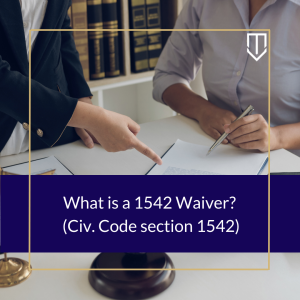 California Code of Civil Procedure section 998 incentivizes parties in litigation to settle their disputes before trial. The statute provides that up to ten days before trial, either party may submit a written offer to the other to settle the case under specified terms. (CCP § 998(b).)
California Code of Civil Procedure section 998 incentivizes parties in litigation to settle their disputes before trial. The statute provides that up to ten days before trial, either party may submit a written offer to the other to settle the case under specified terms. (CCP § 998(b).)
If the plaintiff rejects the defendant’s timely offer and, after trial, receives a judgment not more favorable than the one offered by the defendant, then the plaintiff must “pay the defendant’s costs from the time of the offer.” (CCP § 998(c)(1).) In most civil actions, the court also has the discretion to force the plaintiff to cover a “reasonable sum” of the defendant’s costs of using expert witnesses incurred after the offer was made.
When a defendant rejects the plaintiff’s timely offer and later receives a judgment at trial that is not more favorable than what the plaintiff offered, the court has the discretion to force the defendant to cover a “reasonable sum” of the plaintiff’s costs of using expert witnesses incurred after the offer was made. (CCP § 998(d).)
 California Partition Law Blog
California Partition Law Blog


 The Probate process can be intimidating and confusing. In addition to having to deal with the death of a loved one, adding the resolution of legal and real estate issues on top of everything else can feel like a lot.
The Probate process can be intimidating and confusing. In addition to having to deal with the death of a loved one, adding the resolution of legal and real estate issues on top of everything else can feel like a lot. Before undertaking litigation over real estate in California, title insurance can help to provide clarity as to important ownership questions. Title insurance is not just nice to have, in many instances, the law specifically envisions that the parties will obtain a title report of some type. For example,
Before undertaking litigation over real estate in California, title insurance can help to provide clarity as to important ownership questions. Title insurance is not just nice to have, in many instances, the law specifically envisions that the parties will obtain a title report of some type. For example,  It is an unfortunate fact that many marriages don’t make it out of the engagement stage. While this can be a difficult time for all involved, the situation can only become more dire when real property is involved.
It is an unfortunate fact that many marriages don’t make it out of the engagement stage. While this can be a difficult time for all involved, the situation can only become more dire when real property is involved. Civil Code section 1542 provides, “
Civil Code section 1542 provides, “ No, not unless they want to convert their own, singular interest into two or more shares. The reason for this is that grantors in
No, not unless they want to convert their own, singular interest into two or more shares. The reason for this is that grantors in  In California, an unrecorded interest is valid between the parties thereto and those who have notice thereof. (Civ. Code § 1217.)
In California, an unrecorded interest is valid between the parties thereto and those who have notice thereof. (Civ. Code § 1217.) A right of first refusal is, essentially, an option contract. It is a contract or a condition in a contract between the owner of an asset, and some other person with an interest in that same asset, that allows the interested person to buy the asset from the owner instead of allowing the owner to sell it to a third party. Put differently, it’s a conditional right to acquire property, depending on the owner’s willingness to sell. (Campbell v. Alger (1999) 71 Cal.App.4th 200, 206.)
A right of first refusal is, essentially, an option contract. It is a contract or a condition in a contract between the owner of an asset, and some other person with an interest in that same asset, that allows the interested person to buy the asset from the owner instead of allowing the owner to sell it to a third party. Put differently, it’s a conditional right to acquire property, depending on the owner’s willingness to sell. (Campbell v. Alger (1999) 71 Cal.App.4th 200, 206.) Under California’s Civil Code, real property refers to land, and things affixed to land such as houses. (Civ. Code § 658.) When people think of “property” they may envision a large lake house or a humble home. But this is only one type of property – real property. Personal property, on the other hand, is a broad term that encompasses property rights in basically everything else. A patent is property, and so are the apples that grow on trees in someone’s back yard, and so are the pipes and plumbing that run underneath someone’s house.
Under California’s Civil Code, real property refers to land, and things affixed to land such as houses. (Civ. Code § 658.) When people think of “property” they may envision a large lake house or a humble home. But this is only one type of property – real property. Personal property, on the other hand, is a broad term that encompasses property rights in basically everything else. A patent is property, and so are the apples that grow on trees in someone’s back yard, and so are the pipes and plumbing that run underneath someone’s house. Proposition 19 is a new law in California that significantly affects the way property taxes are assessed on homes when deeded to heirs. While intra-family transfers were previously protected under Proposition 13, its effect has been significantly bludgeoned. On the other hand, Proposition 19 does include the added benefit of extra assessment transfers for residents over the age of 55.
Proposition 19 is a new law in California that significantly affects the way property taxes are assessed on homes when deeded to heirs. While intra-family transfers were previously protected under Proposition 13, its effect has been significantly bludgeoned. On the other hand, Proposition 19 does include the added benefit of extra assessment transfers for residents over the age of 55.